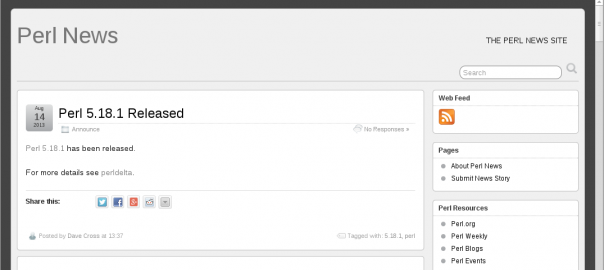If you were at YAPC::Europe this week you might well have seen Richard Jelinek’s talk about how to increase Perl’s popularity (update: the slides are here). As part of that talk he suggested that the Perl community needed to run more of its infrastructure using Perl and (amongst other examples) he mentioned a discussion he had with an unnamed Perl News administrator about why Perl News is run using WordPress (which is written in PHP).
I’m happy to admit that I’m the unnamed Perl News administrator. But I think that Richard’s report of our conversation omits a lot of the detail in the points I tried to make to him. So I’d like to take the time to clarify my thoughts on this. There are three points in particular that I’d like to make.
1/ Multitasking
I have a lot of projects on the go. I should probably cut back a bit. Yes, I could start a project to create a WordPress clone in Perl, but that would mean that I would need to shelve a few other projects for some considerable time. The alternative is to quickly build Perl News using an existing tool. You know which option I chose. Of course, you’re free to disagree with me.
2/ Network Effects
Even if there was a capable WordPress replacement written in Perl I probably wouldn’t use it. You see, WordPress isn’t just the software. There’s also a huge community behind it. And that means that there are a huge number of themes and plugins available – with more being released all the time. Every time I want to add a feature to WordPress site, I just find the appropriate plugin and install it. Without that huge community, I would have to implement lots of stuff myself. Which would mean that either I’d be working on Perl News full-time or Perl News would be missing lots of features (for example the social networking hooks).
Don’t forget that I’m also involved in running blogs.perl.org. That runs on Movable Type (which is written in Perl). And have you seen the list of issues that we have with that site?
3/ Patches Welcome
Leo and I built Perl News because we thought it was a useful site for the Perl community to have. You can probably tell from the frequency of updates on the site that it’s not exactly a top priority for either of us. Personally, I’d be very happy if someone else took responsibility for it. So if you think that you can do better, or if you have a Perl system that you think could be used in place of WordPress without any removal of functionality, them please let us know. I’d be really happy to give you a dump of our database (so that you have all the existing stories) and update the DNS to point the domain at your server.
If it matters to you to have Perl web sites running on Perl code, then just go ahead and do it. I would be happy to see it happen. I just don’t have the time to do it myself.
Also published on Medium.


Leave a Reply to schiffbruechigeCancel reply